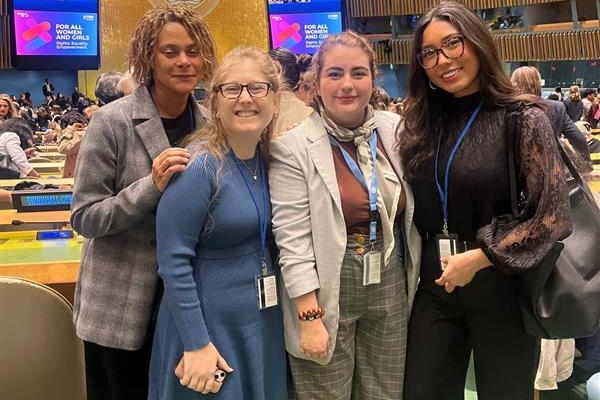30 Years After the Beijing Conference on Women, the Work Continues
 Staff and volunteers of The Advocates attend this year's Commission on the Status of Women
Staff and volunteers of The Advocates attend this year's Commission on the Status of Women
The Political Declaration adopted by the 69th session of the Commission on the Status of Women (CSW) this March delivers a sobering truth: no country in the world has fully achieved gender equality or the empowerment of women and girls. Every five years at the CSW, the international community gathers to assess the lived realities of millions of women and girls and adopt a Political Declaration that sets shared goals and renews global urgency for lasting gender equality.
The 2025 Political Declaration was adopted in the midst of deeply polarized negotiations, with several states, including Argentina, Nigeria, Russia, and the United States, seeking to undermine long-standing language on gender and gender equality. Within this context, the fact that the Declaration was adopted at all signals a degree of resilience in the face of rising global backlash.
The Advocates for Human Rights welcomes the Declaration’s recognition of areas that require further attention, including technology-facilitated gender-based violence, the burden of unpaid care work on women, the impact of armed conflict on women and girls, and the importance of engaging young women as well as men and boys in achieving gender equality.
Yet the Declaration leaves much to be addressed.
The Declaration fails to mention sexual and reproductive health and rights, a critical omission given the growing attacks on these rights globally. For example, the UNFPA has found that there are 58 countries where at least one in four women still cannot make their own decisions about their sexual and reproductive health. Despite this reality, the Declaration overlooks access to abortion, contraception, family planning, comprehensive sexuality education, and the recognition of same-sex marriages and adoptions.
The Declaration fails to explicitly mention consent, beyond broad references to "sexual violence"— another shortcoming that falls short of international standards setting out inclusive and consent-based definitions. This is a critical omission, as many States have yet to align national legislation with international norms, resulting in continued tolerance for harmful practices. In some countries, judicial rulings are often based on gender stereotypes, resulting in minimal sanctions or punishments for the perpetrator, especially if they marry the person they raped.
Other critical absences include the lack of explicit mention of intimate partner violence and the ongoing use of parental alienation syndrome in child custody battles, which is often used to discredit mothers’ claims of abuse and place children in the custody of abusers. This reflects a broader failure to center survivors' voices and experiences in policymaking. Through its advocacy and partnerships, The Advocates has documented how courts in countries such as Spain and Croatia often dismiss violence allegations in custody cases, prioritizing contact with the abusive parent. Our findings demonstrate that parental alienation claims are frequently weaponized against protective mothers, placing children at risk and denying survivors access to justice.
With the anti-rights and anti-gender movements growing as a threat to gender equality, it is equally concerning that the Declaration omits mention of the transnational, coordinated efforts that are eroding decades of progress for human rights. Between 2013 and 2017, an estimated $3.7 billion USD was poured into efforts to oppose gender equality, sexual and reproductive rights, and LGBTIQ+ rights. These movements attack gender equality and perpetuate deeply harmful gender stereotypes to undermine the laws and institutions that protect women and girls. The failure to specifically call out and counter these attacks reflects an alarming lack of political courage. The Advocates has been tracking the rise of anti-gender, far-right movements, highlighting civil society strategies to fight back, and building a united front to push back against this new wave of human rights regressions.
This year marks the 30th anniversary of the Beijing Platform for Action, offering a critical opportunity to revisit and strengthen our global commitments to gender equality. The Advocates for Human Rights has interviewed activists from the 1995 conference, highlighting an intergenerational dialogue that continues to shape activism today. While challenges like rising anti-rights movements and threats to reproductive freedoms persist, the Beijing anniversary is a powerful reminder that progress requires sustained, strategic action. Now is the time to double down on the work ahead and push for the legal and political changes necessary to achieve true gender equality. Join us while we continue working to combat these challenges by volunteering, supporting our work, and getting informed.



